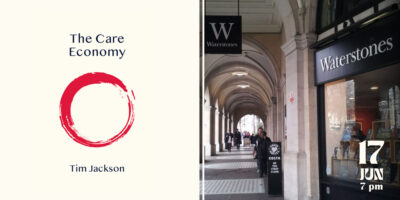Developing the philosophy for a sustainable prosperity
A shift towards a sustainable prosperity must ultimately be a shift in values, and needs to be understood as such, co-investigator Dr Will Davies writes in this blog, setting out the work programme for our research theme on the meaning and moral framing of the good life.
Blog by WILL DAVIES

Mainstream economics prides itself on being able to isolate questions of ‘efficiency’ from broader, more contentious philosophical questions of justice, equality, rights and the good life. This is clearly an advantage for policy-making when the economy is working in a predictable and sustainable fashion. But it also locks us into a technocratic strait-jacket, making it harder to engage with critical and moral questions regarding the nature of contemporary capitalism. A shift towards sustainable prosperity must ultimately be a shift in values, and needs to be understood as such.
In a strand of work entitled Meaning and Moral Framing of Sustainable Prosperity, we will seek to bring a variety of moral and philosophical perspectives to bear on contemporary economic institutions, and to consider what might be the moral underpinnings of more sustainable alternatives. This involves bringing moral philosophy and economics into greater dialogue with one another, by posing moral questions about institutions such as ownership, markets, capital, money and corporate governance.
One aspect of this will involve publishing papers by leading philosophers on what ‘sustainable prosperity’ might or should mean. These will be published from autumn 2016 onwards. Another will involve seeking to explore and illuminate the moral worldviews of senior businesspeople, international bodies and members of the public, with a view to understanding how they conceive a just and sustainable economy.
A couple of philosophical concerns will run throughout this. Firstly, we hope to explore the question of the ‘good life’ and how it can be economically facilitated, from a range of philosophical perspectives. Secondly, we will focus on the concept of ‘inheritance’ in various guises, from private family inheritance (with the moral and political questions that raises), through to broader issues of intergenerational justice and ecological inheritance.
Sustainable prosperity can only be achieved through hard work of institutional and political transformation. But reorientations of this nature require a sense of moral and philosophical purpose, through which alternative institutional arrangements can then be constructed.



